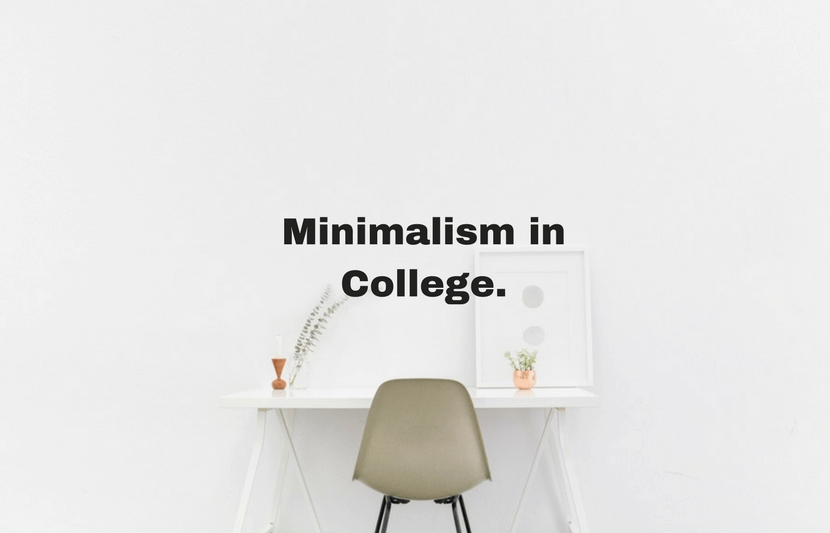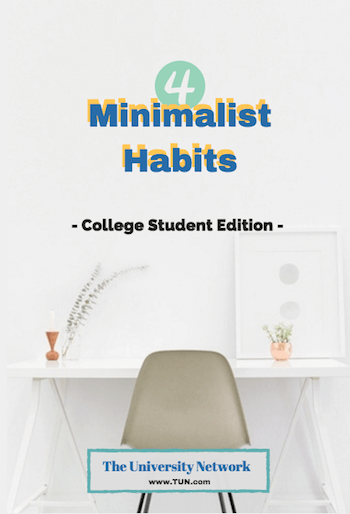Minimalists believe that when we subtract unnecessary things that no longer warrant our energy from our lives, we can make room for the things that truly matter. Minimalism is, at its core, a basic mathematical method to get more meaning out of life.
A common misconception about minimalism is that life is boring without material possessions. It’s actually not necessary to get rid of everything you have to be a minimalist. To reap the benefits of minimalism, simply making small adjustments can have a big impact. Of course, consciously considering spending goes hand in hand with this philosophy.
Does this add value to my life? Does it make me happy?
Before buying anything, minimalists determine whether the purchase will add value to their life or otherwise bring them joy. Making this decision can change spending habits and help us realize that we already possess most of the things we need. The spending decisions made from taking the time to ask this question may seem small, but this strategy, over time, can fundamentally change the way we spend and the amount of items we own.
With minimalism, life is simplified, and time is saved, by getting rid of things that are unnecessarily taking up more time. University students often speak about not having enough time in a day to get work done. If this sounds familiar, minimalism might be helpful to help you focus on the things that you feel is actually deserving of your valuable time. Over time, minimalism helps us to look around and truly value what we have, while also making room for the non-material things that truly matter.
Love people, use things.
The Art of Letting Go | The Minimalists | TEDxFargo
The first step in adopting a minimalist lifestyle is realizing that we often already possess everything we need. Realizing this fundamental notion is one of the life changing parts of minimalism; instead of wanting more, it switches brains and budgeting to a position of gratitude. Keeping this thought in mind will program behavior, so we become less likely to buy things we don’t really need or feel compelled to buy because of advertisements or sales. Minimalism is a philosophy that can be easily applied to everyday life to improve your study habits, mindset, and budgeting habits.
[divider]
4 Minimalist Habits – College Student Edition
1. Clear Desk, Clear Mind.
A common study tip is to turn off distractions, like phones or Facebook notifications, but often these tips overlook the other material distractions in our study space. One of the core beliefs of minimalists is that a clear space equals a clear mind, or at least a clear space equals a mind with more room for other thoughts. I have found that my creativity and productivity increase when I incorporate this strategy. By removing distractions, or unnecessary material things, there are simply less things available in the space around us to grab our attention. Less things in life mean less things to think about, therefore giving you a clear mind to really delve into your studies. Try these tips:
- Take five to ten minutes before studying to go through everything on your desk and take off anything that you are not immediately using to study.
- It can be easy for notes to become scattered and unorganized. If you have notes lying around that are unimportant or unclassified, take time to organize old notes and assignments into folders.
- If you have notebooks or textbooks, put them off to the side, in a drawer, or away from your desk, and only take out the ones necessary to focus fully on the course you’re studying at that moment.
2. Clean by Category.
Pick a specific category of items or space, such as books or keepsakes, and ask yourself the fundamental question, “does this add value to my life and/or bring me joy?”. Take your time and only keep only those items that generate an absolute “yes”.
- Go through everything you own slowly and get rid of anything that no longer serves a purpose or brings you joy.
- Try to find a friend or thrift shop that could put items you no longer need to use.
- Get rid of notes and textbooks collecting dust from last semester; take pictures or scan key pages instead.
- Go through the apps on your phone and delete anything you haven’t used in the last few weeks. Bonus points if you go through and clean out photos or following lists on social media accounts.
3. Change Spending Habits.
Evaluate your spending habits and try to buy only the things you need. When we realize how few things are actually needed to make us happy, we can stop spending impulsively or going to the mall just to browse. When we change our spending habits by only buying what we need, we are left with more money in our account. It’s not easy to change our spending habits, but it is totally worth it. I’m speaking from my own experience; one of the main reasons I was able to afford studying abroad this semester was because I changed my spending habits. I realized that I had too many unnecessary things in my life and made up my mind not to give in to my usual impulses. Not buying unnecessary stuff is incredibly helpful as it allows you to have a better idea of what you actually need while saving more money. Minimalism is a philosophy perfect for the student budget.
- Before buying anything, ask yourself the fundamental question “does this add value to my life and/or bring me joy?”
- Make a running shopping list when there is something you need and get only those items when you go to the store to buy it.
- Don’t go shopping unless there are actually things you need to buy.
- Instead of spending money and going out with friends to the mall or to dinner, try going for a walk, making dinner at home, or combining a walk and a dinner.
4. Clean Out the Closet.
Minimalism is simple mathematics. Take the case of your closet, for instance. If you have more clothes, you will spend more time doing laundry, folding, ironing, and putting away clothes. Imagine how much time we all spend on simple mundane tasks like the ones I’ve listed above. How much time is taken for these tasks in a year? I think the answer would be: too much time. Ask yourself then how much time would be gained when you clean out your closet by applying the fundamental question: “does this add value to my life and/or bring me joy?” Don’t just throw out the clothes you don’t need though. Make sure to consider options like consignment stores or thrift stores when disposing of clothes you no longer want.
When we look around and appreciate the things we have, we become not just happier but also more fulfilled. A lot of high school graduation speeches end with hopes of students finding themselves in the paths they take forward. Although there is certainly no one key philosophy or quick trick to finding purpose in life, living with less stuff helps to clear out the things we are attached to so we can discover what it is we are drawn to. It may seem abstract and philosophical, but with the following strategies I recommend, implementing minimalism can help to have a priceless impact on the way we think and behave.




